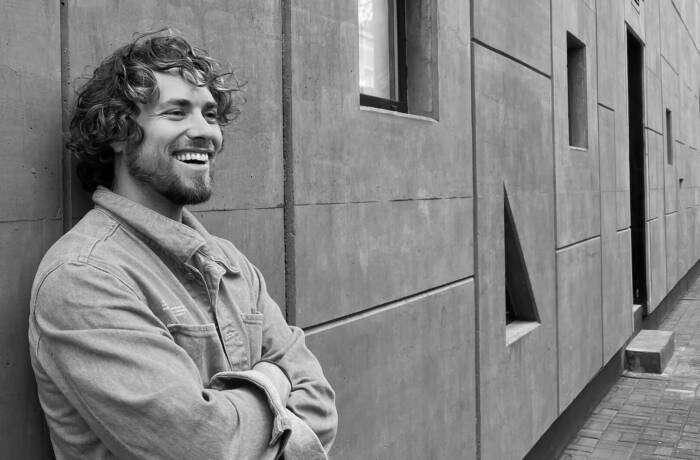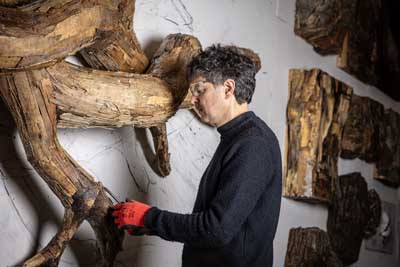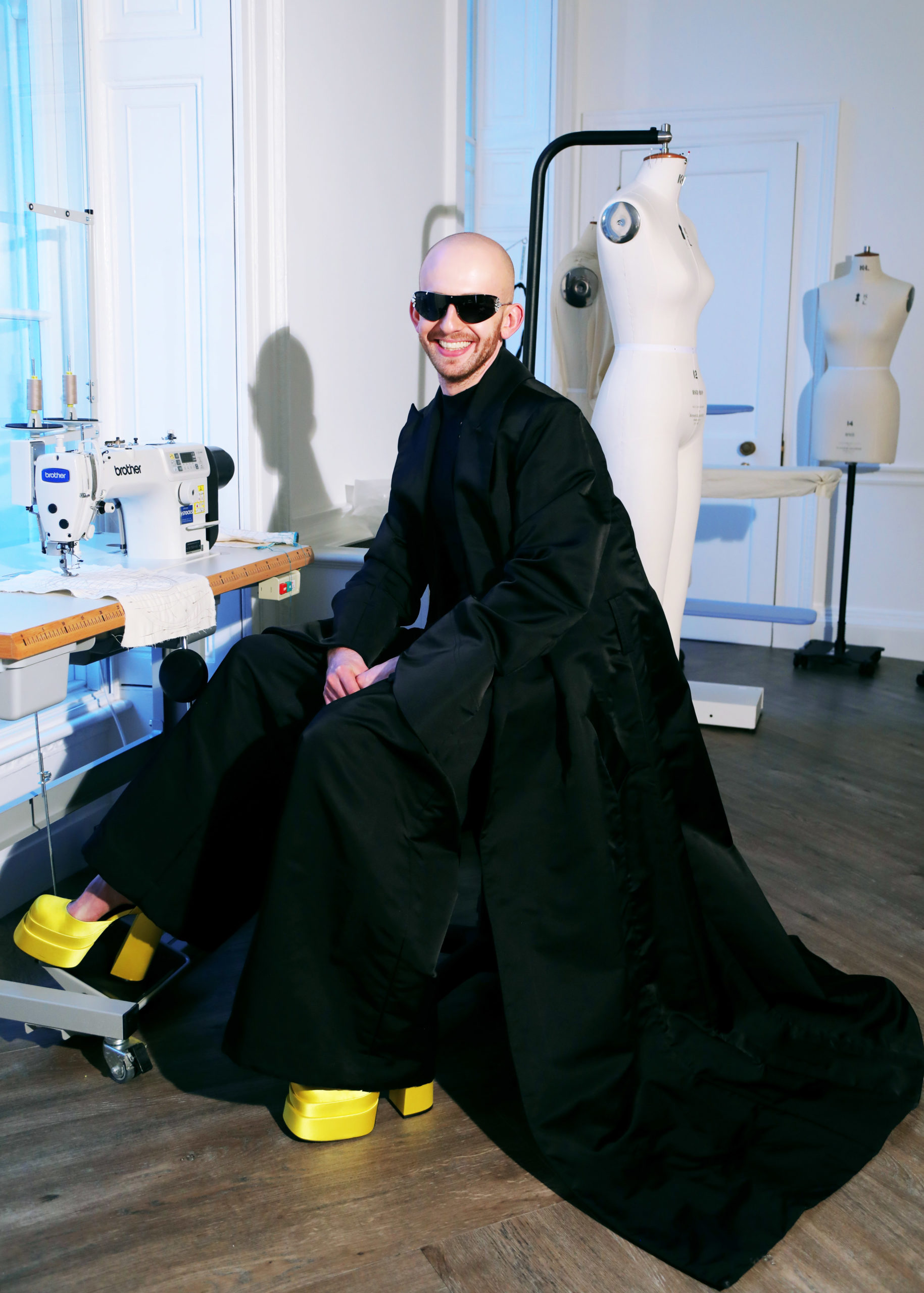
Patrick McDowell in his studio at the JCA London Fashion Academy. Photograph by Aaron Bird
As the world’s fashion capitals gear up for fashion week, we’re celebrating designers who are paving the way for a more sustainable and ethical industry. Here, Patrick McDowell meets with Ella Johnson in his new studio at the JCA London Fashion Academy to discuss how sustainable fashion and social impact go hand in hand
Liverpool-born, London-based designer Patrick McDowell captured the world’s attention in 2018 with his graduate collection made from old Swarovski crystals and Burberry fabric donated by Christopher Bailey. Proving that sustainable fashion need not be synonymous with mundanity, McDowell was soon after nominated by Anna Wintour for the Stella McCartney Today for Tomorrow Award, and he subsequently went on to host London Fashion Week’s first ever Swap Shop.
Today, the 26-year-old has just been named the inaugural Designer in Residence at Professor Jimmy Choo’s JCA London Fashion Academy, where he will continue to make one collection a year under his eponymous label while carrying out sustainability advisory to other brands. But far from becoming a global brand overnight, McDowell is preoccupied with elevating other underprivileged creatives through scholarship programmes within the industry. Here, he explains why there is no time to waste.
Follow LUX on Instagram: luxthemagazine
LUX: Your first interaction with upcycling was when you created a bag from an old pair of jeans at 13. Was that a consciously sustainable act?
Patrick McDowell: It was the defiant act of a child who had been told ‘no’. Typically, in very working-class areas, your school uniform is bought three sizes too big so that you can grow into it. I was just sick of this really long satchel bashing against my knees, so I made one that was shorter out of a pair of jeans I knew I was never going to wear. Nowadays, it’s quite cool for kids to chop and make stuff, but back then it was all about buying. So, while I had made the bag with a needle and thread, people didn’t believe that I had made it. I quite liked that reaction, because I thought I must be alright [at fashion] if people thought I’d bought it.
It was crazy, really: I was this curly haired, 13-year-old child – nobody could tell if I was a boy or girl – walking around in this very sad uniform with these elaborate handbags that I had been making! It was a very working-class suburb of Liverpool, and looking back, I suppose it must have been quite unusual.
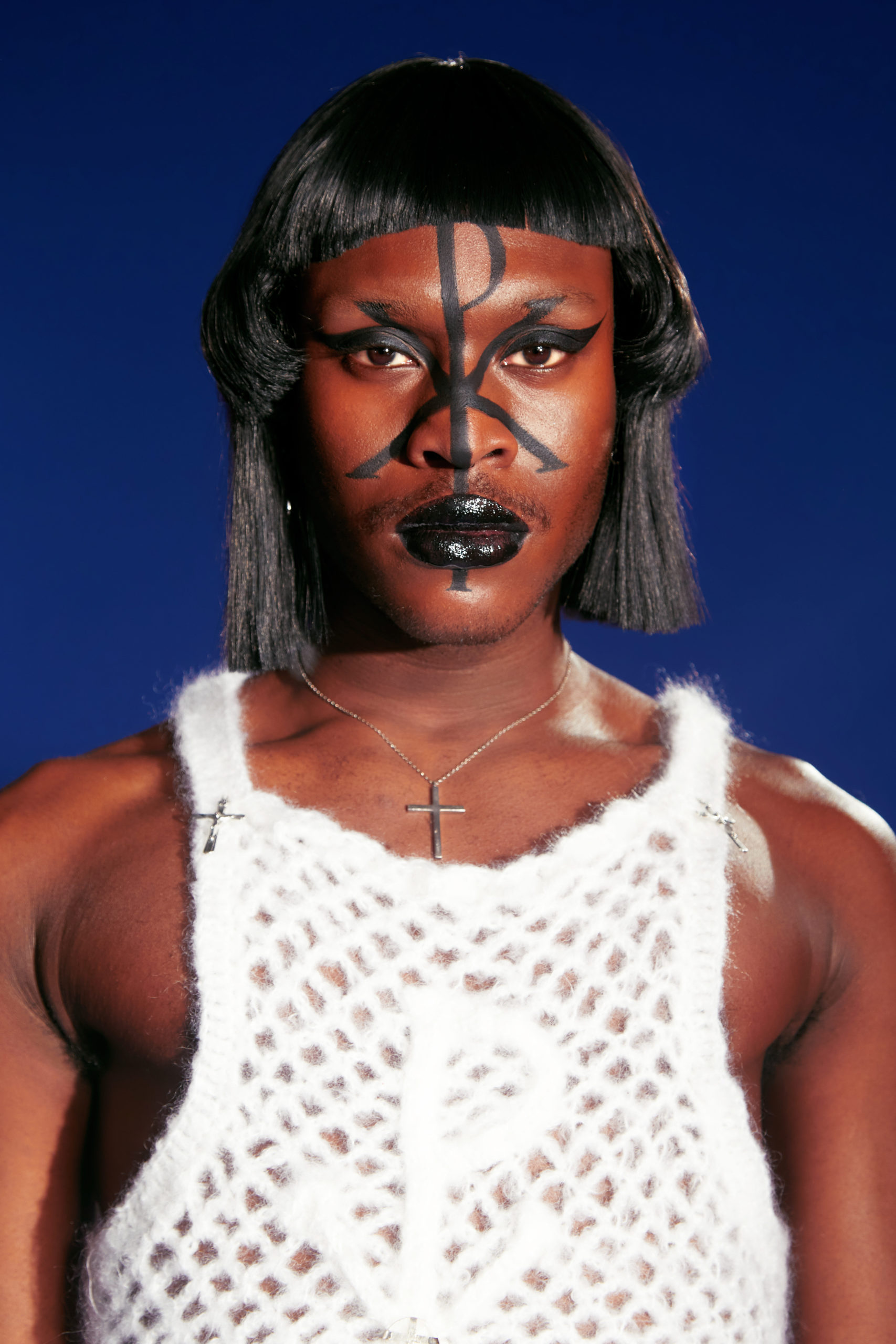
LUX: Your ‘Catholic Fairytales’ collection addresses some of that disillusionment.
Patrick McDowell: I had a very Catholic upbringing. Every day started with a prayer. As a gay person growing up in that, it was quite challenging to realise that everything built around you was disagreeing with who you were. At 13, my Religious Studies teacher told me that it was OK to be gay, so long as I didn’t act on those feelings.
So, it was quite therapeutic doing ‘Catholic Fairytales’. The final irony of that collection is that what I did is way less avant-garde than actual priest robes, which have months and months of handwork. The recent history of the Catholic church is, on the whole, one of extreme extravagance. I did this very big, phallic hat for my collection, which people were surprised that I hadn’t invented – there was a papal tiara that shape, which they got rid of in the 1950s because they thought it was too over the top.
Read more: Patrick Sun on Promoting LGBTQ+ Art in Asia
LUX: What was your experience of joining Central Saint Martins as a northern, working-class, queer individual?
Patrick McDowell: I almost quit in the beginning. I somehow managed to get in without a foundation course, which is not meant to happen, and I failed the first year. I had such a panic because I’d spent six years trying to get there, but never considered what I’d do when I got there. All that self-limiting stuff comes from the class system and growing up working class. The school system is awful. It’s one of the reasons why I’m now such an advocate for creative education. I experienced how beneficial that kind of education can be, but also how hard it can be if you don’t do the ‘right’ things in the ‘right’ way.
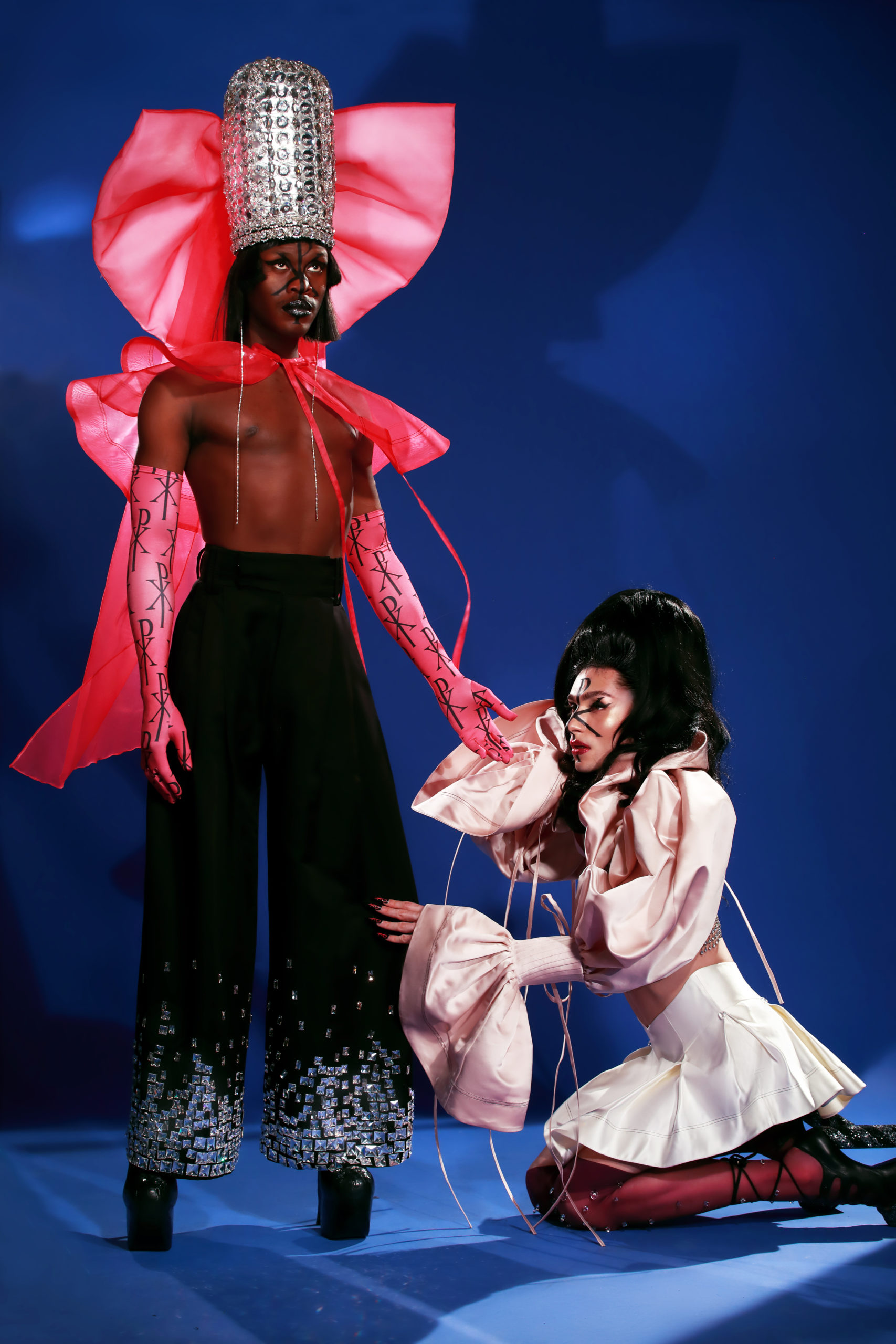
LUX: Do you feel a responsibility to elevate others in the industry?
Patrick McDowell: I’m very aware of how privileged I am, but my journey, from where I came from to where I am now, was a lonely one. I embody that journey, but at the same time, I graduated from one of the world’s best fashion schools with a collection made from Burberry fabric donated by Christopher Bailey, and old Swarovski crystals, with a British Fashion Council scholarship. All of those things opened the doors for me. That’s why I cried every day for two weeks, walking across Hanover Square, when I first came [to the Jimmy Choo Academy]: I was so overwhelmed. But I’ve realised that by letting myself get so overwhelmed, I wasn’t doing anything productive. When I started looking into it, I was shocked that there aren’t more scholarships available in schools. It’s so easy and inexpensive for brands to do it, plus there’s no bad press for starting one. That’s why I built a scholarship programme into my next contract with Pinko. It’s also why I’ll always push for as many social and educational initiatives as I can. It’s usually something people come to later in their career, but in my view, there’s no time to waste.
LUX: You say that it is not only a designer’s responsibility to ‘create beautiful clothing’, but to also ‘redesign the systems they sit within’. How are you doing that from a sustainability perspective?
Patrick McDowell: I was already sustainability ambassador for the Jimmy Choo Academy, and now I’m also Designer in Residence. I only do one avant-garde collection a year. I’ll be doing my next collection in September so there’s no rush, which I appreciate: I can do it when I want to do it.
The rest of the year, I work with brands, schools, and Graduate Fashion Week. I mentioned Pinko, with whom we have a social corporate and sustainability focus. I’m about to do my fourth collection with them, but this year we’ve expanded it so that the business is also committing to 30% of this overall product having a sustainable attribute. We’re also starting a social sustainability programme to start scholarships and a stronger internship programme.
I’m not interested in constantly producing thousands of the same dress in slightly different colours because that’s how you grow a brand through a wholesale business model. I’m not desperate to become a global brand overnight. The impact I’ve made with all the projects I have done has been way bigger because I’ve worked with bigger organisations to make it happen, rather than going at it alone.
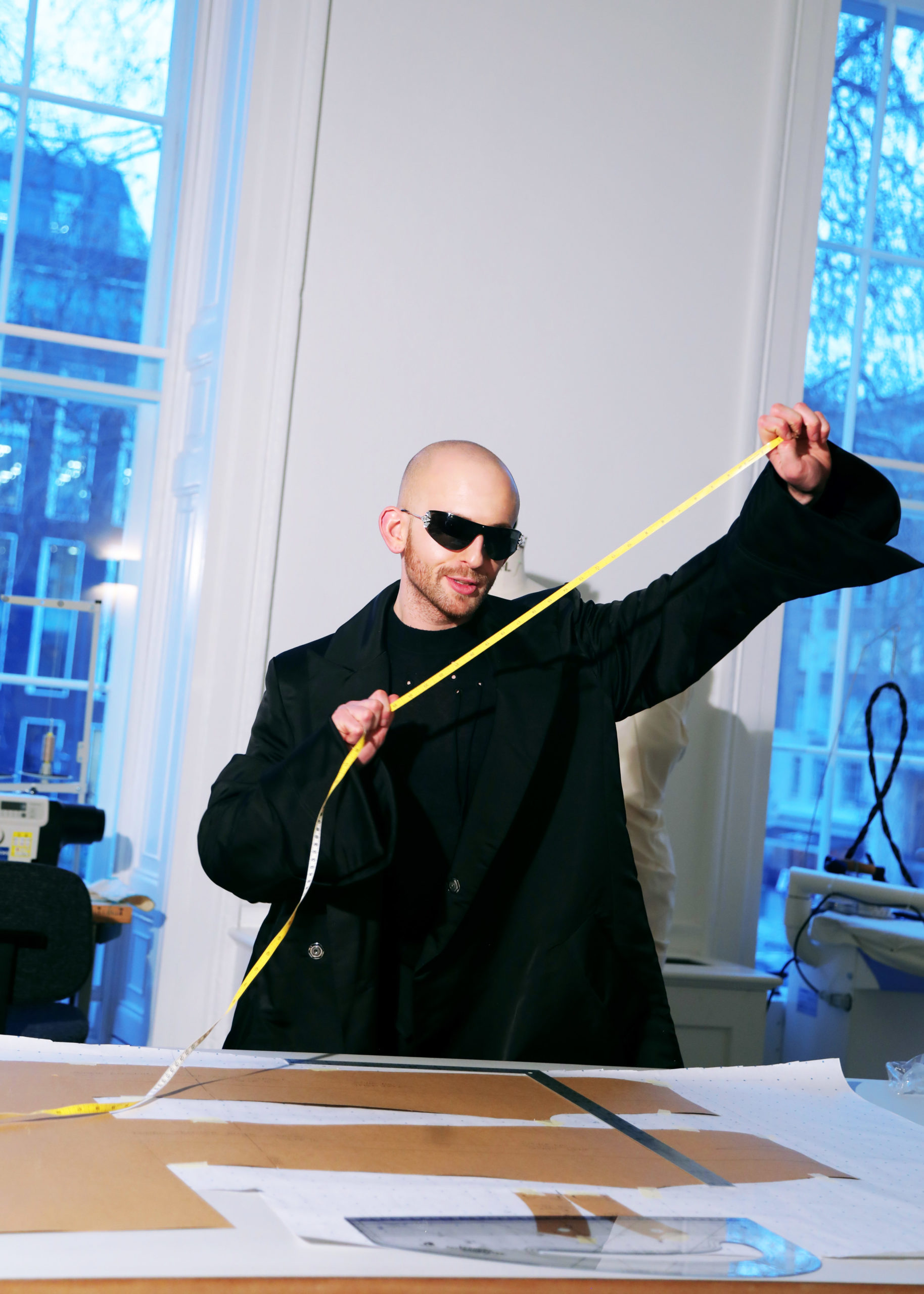
Photograph by Aaron Bird
LUX: This disinterest in building a brand overnight, is it personal to you or common among your peers?
Patrick McDowell: These days, it’s definitely more common for Central Saint Martins students to say they want to do less or fewer collections. Richard Malone is a great example of someone who has a very successful business that he’s intentionally keeping at a certain size, and making beautiful pieces that a certain type of person wants to buy or order. He has a made-to-order service in Selfridges. I never thought I’d see that!
Read more: Markus Müller on the Importance of Global Sustainability Standards
LUX: Would you say that sustainability is a modern day luxury?
Patrick McDowell: I think it is a version of luxury that we see now. For a long time, harm was fashionable. ‘How many exotic animals are in your Birkin? Mine’s got four’ – that kind of thing. Now, people take pride in saying ‘my jacket didn’t harm anything’. That’s an interesting shift. But it’s complicated, because for some people, wearing an outfit from a fast fashion company is their only way to feel like the person they want to be. I’m not going to be the person sitting in this Mayfair studio telling them that fast fashion is wrong. If that’s something that keeps that person going, then they need that. It always goes back to education and class systems, and to the fact that this country is set up to stifle the majority of the people that exist in it. And remembering too that it’s not sustainable either to completely change a business that supports thousands of people, because those people would then have no jobs.
LUX: What has the response been from the brands with whom you work on sustainability initiatives?
Patrick McDowell: It can sometimes be difficult going into a brand and disrupting the whole way they work. A brand is used to working in a very linear way, and then I go in and start asking people to work with each other who would never usually each other. But all those connections are exactly what businesses will need to grow and survive. I hope that I can do these things with brands and then, once I leave, there’s the infrastructure in place for them to do the work themselves.

LUX: It’s as though brands need external disruption to make change.
Patrick McDowell: It can’t happen with the teams as they already exist. Everyone is so busy; it just doesn’t work. But they’re going to have to start somewhere, so that’s where my consultancy approach helps. I’m not locked into these crazy fashion cycles. We have to rethink everything right now, to find creative solutions for everything from journalism to mathematics, science to fashion. It’s an extremely modern way to be working – to be passion- and emotion-led. It’s what resonates.
LUX: During London Fashion Week in 2020, you collaborated with the Global Fashion Exchange to host the first Swap Shop. What was that like?
Patrick McDowell: It was the first Swap Shop for any major fashion week, and we re-circulated 500 garments in 3 days. I always think that fashion weeks should be idea hubs; you don’t have to have it fully formed – just show an idea. We digitally tokenised all the swaps through QR codes, and we didn’t know if it was going to work, but now everyone’s doing it!

LUX: Is this pressure for perfection holding fashion back sustainability-wise?
Patrick McDowell: Sometimes we’re so scared of making everything so polished – especially with sustainability, where there is so much anxiety. We’d rather say nothing, because if we say something, people are going to criticise everything. But we all have a responsibility to just let people try things out and make mistakes. People think businesses are these holy grails of perfection, but the fact is they’re made by people, and people make mistakes.
LUX: It sounds like we need to put the fun back into fashion.
Patrick McDowell: Yes, you have to do sustainability in a way that’s fashion. It’s still fashion week, and it has to work for fashion week. It has to look great. Don’t be lazy. Just because you remade something doesn’t mean it can look bad, it still needs to be aspirational!
That’s one of the reasons my graduate collection went so well, I think, because it was all made from this old Burberry fabric, and it was glam, fab, and clean. It’s an easy message to get your head around: old stuff, turned into new stuff. I haven’t reinvented the wheel, or spent 20 years trying to get the spider make silk. Not everything has to be life-changing.
LUX: Can you tell us about your next collection?
Patrick McDowell: Marie Antoinette.
Find out more: patrickmcdowell.co.uk
All fashion images: Patrick McDowell’s ‘Catholic Fairytales’ collection, photographed by Aaron Bird

